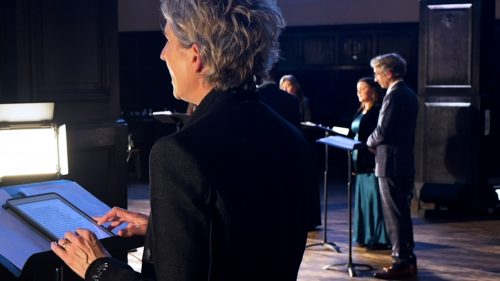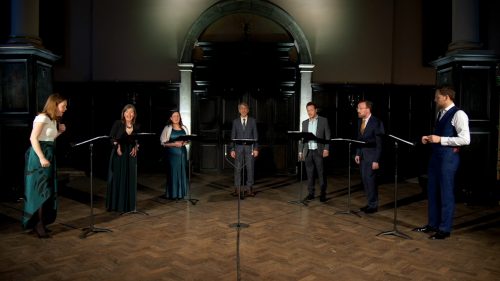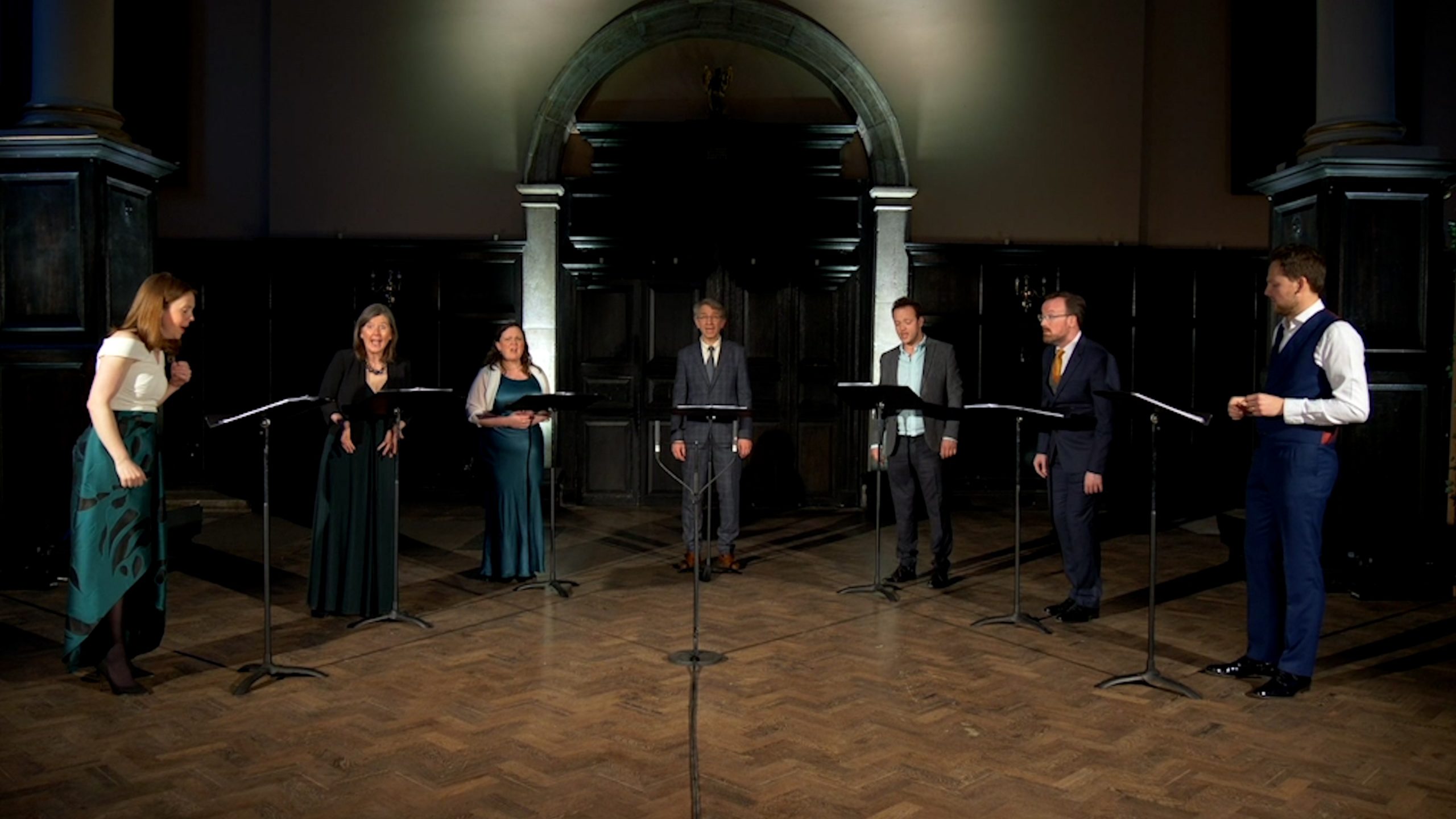 United Kingdom LIVE from London Spring – Re-Wilding The Waste Land: Tamsin Greig (narrator), Robert Hollingworth (director/countertenor), I Fagiolini (Anna Crookes, Rebecca Lea [sopranos], Martha McLorinan [mezzo-soprano], Matthew Long [countertenor], Greg Skidmore [baritone], Frederick Long [bass]). Streamed from the VOCES8 Centre, London, on 22.4.2021. (CC)
United Kingdom LIVE from London Spring – Re-Wilding The Waste Land: Tamsin Greig (narrator), Robert Hollingworth (director/countertenor), I Fagiolini (Anna Crookes, Rebecca Lea [sopranos], Martha McLorinan [mezzo-soprano], Matthew Long [countertenor], Greg Skidmore [baritone], Frederick Long [bass]). Streamed from the VOCES8 Centre, London, on 22.4.2021. (CC)

Tomás Luis de Victoria – Tenebrae Responsories for Holy Saturday: O vos omnes
T. S. Eliot – The Waste Land (Part 1): The Burial of the Dead
Byrd – Deus, venerunt gentes
Ben Rowarth – Deus, venerunt gentes
Kenneth Leighton – God’s Grandeur
T. S. Eliot – The Waste Land (Part 2): A Game of Chess
Tomás Luis de Victoria – Tenebrae Responsories for Good Friday: Caligaverunt oculi mei
T. S. Eliot – The Waste Land (Part 3): The Fire Sermon
Joanna Marsh – Geocentric
Vaughan Williams – Silence and Music
T. S. Eliot – The Waste Land (Part 4): Death by Water
Tomás Luis de Victoria – Tenebrae Responsories for Holy Saturday: Ecce quomodo moritur
Shruthi Rajeskar – Ganga’s Peace
T. S. Eliot – The Waste Land (Part 5): What the Thunder Said
Joanna Marsh – The World is Charged
The final concert in VOCES8’s LIVE from London Spring series offered a meditation on a timely theme: that of renewal, regeneration and cycles utilising T. S. Eliot’s The Waste Land as a gateway and inspired by Sir David Attenborough’s plea to ‘Re-Wild’. From the darkness of Victoria’s Tenebrae Responsories for Holy Week (performed at their rarely-encountered original pitch) and Byrd’s Deus, venerunt gentes’, the music moved through a sequence of work towards a piece with a title with an unmissable resonance with the world today: Joanna Marsh’s The World is Charged.
Blake’s poem The Waste Land was written in 1921 and published the following year; the world was in something of a parallel place then, some 99 years ago, not too long after the First World War. Acting as a thread through the performance, Victoria’s gloriously beautiful Tenebrae Responsories speak of the sorrows of Holy Week as a reflection for the current world sorrow.
‘April is the cruellest month’ begins the first tract from Eliot’s Waste Land; the whole passage was beautifully read by Tamsin Greig., whose presence throughout was a guiding light as well as a veritable encyclopaedia of voices and accents. Byrd’s setting of verses from Psalm 14, Deus venerunt gentes (O God, the gentiles are come into thine inheritance) itself reflects the bleakness of the Byrd in the most beautiful way possible (in its railing against the then treatment of the Catholics). Fascinating, too, how the choir added their own whisperings to the reading before the bittersweet dissonances of Ben Rowarth’s setting. Rowarth, a name new to me, is currently working on a doctorate under Robert Saxton at Oxford University; his music is infinitely haunting and shot through with poignant beauty. He requires complex skills from the choir; it is impossible to imagine finer performances than those by I Fagiolini.

Moving to the second part, ‘A Game of Chess’, the choral cry of ‘The world is charged with the grandeur of God’ brought the onset of the awesome trajectory of Kenneth Leighton’s God’s Grandeur. Leighton’s interpretation of the grandeur of deity reflects the fearsome presence of a supranatural Being, but it is one that includes tenderness, too.
Throughout, Tamsin Greig’s grasp of Eliot’s poetry was total. The plethora of different voices she used in ‘The Game of Chess’ was simply brilliant; and the shock of the move to the veiled Victoria of ‘Caligaverunt oculi mei’ (My eyes became dim with weeping) was stark indeed. Joanna Marsh’s Geocentric (setting a text by Pattiann Rogers) is a celebration of the capabilities of the voice delivered with a light touch. One moment we are in modernist territory, the next the music threatens to take a hard left into slinky jazz before swerving at the last moment. Beautiful to hear not only how the members of I Fagiolini can dialogue with one another, but also how they can blend so beautifully. Marsh writes with a deliciously light touch.
The final two parts of the concert, ‘Death by Water’ and ‘What the Thunder Said’ found Vaughan Williams’s meditation Silence and Music (Ursula Wood) nestling next to more Victoria and new pieces by Shruthi Rajasekar and Joanna Marsh. The Vaughan Williams seems enshrouded in mysticism; it requires a concentration it certainly received here.
The fragility of Victoria’s ‘Ecce quomodo moritur justus’ (Behold how the righteous man dies’) seemed reflected in Shruthi Rajasekar’s Ganga’s Peace, a hymn to the ‘Mother’ River Ganges, a masterly piece that speaks straight to the heart, perfectly proportioned. The text is also a plea for us to ‘control what we take’ whether that be water from a river or kindness, bound together by the vital phrase ‘be compassionate’. Closing with The World is Charged by Joanna Marsh was a masterstroke; her musical language simultaneously conveying reminiscence and hope for the future. The John F. Deane’s poem set here has a huge remit, from ragwort to Sirius; Marsh’s setting makes it possible to encompass all this and, by implication, yet more. It contains surprises, too: setting ‘Sirius’ with a deeply rooted, earthed bass foundation instead of allowing it to fly to the firmament.
The perfect way to end the series of Spring concerts from the VOCES8 Centre.
Colin Clarke
For information about the VOCES8 Foundation click here.
